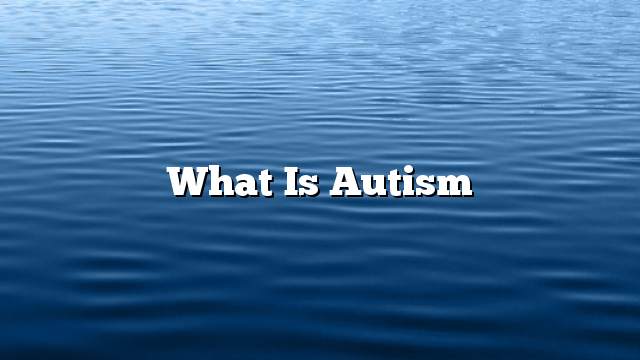Autism
Autism is defined as a developmental disability that affects the individual’s actions, communication with others, and interaction with others, making him unaware of what is going on around him, weakening his response to the scenes and sounds around him, unable to harmonize with others and form relationships, making him 50% of parents note that their children have autism at the age of 12 months, and 80-90% of parents notice that their children are infected when they complete their second year. Males are more likely to have autism; Autism is one in every 42 male children, While one out of every 189 girls is diagnosed with autism.
Diagnosis of autism
Doctors diagnose autism based on the behavior of the child, based on the Diagnostic and Statistical Manual of Psychiatric Disorders by the American Psychiatric Association’s manual. The diagnosis requires observation of a disorder in the child’s social communication, and suffering from repetition of limited movements and interest Often limited.
Symptoms and signs of autism
The effect of autism varies from person to person, but there are some common symptoms among people who are infected, including:
Weak social skills
The vulnerability of the victim to social skills is one of the most common signs of autism, and often these signs appear at the age of eight to ten months, including the following:
- Child preference stay alone.
- The unwillingness to console others during his grief.
- His indifference to play and talk with others.
- Rejecting and trying to avoid physical communication.
- Not understanding the feelings and feelings of others.
- He responded to his call by others.
Weak communication with others
The weakness of the child’s communication with others may appear in the form of many disorders, including the following:
- Problems with speech and speech; statistics show that 40% of autism patients never speak, 25-30% show some language skills at the age of breastfeeding and then lose these skills as they age, and some children with autism begin to speak late compared to their peers.
- Echolalia means repeating the same phrase over and over again.
- Problems with the use of pronouns during conversation; for example, the child says “you” instead of “I”.
- Do not distinguish caresses and ridicule.
- Scarcity or lack of gestures, and non-response.
- The inability to continue discussing the same topic during the general conversation or answering questions.
Disruptions in behavior
Autistic children often behave in a strange way. These behaviors include:
- Aggressive in acting with himself and with others as well.
- Shorten the period of attention and listening.
- Confusion, and loss of coordination.
- Rush and act without thinking.
- Sensitivity to touch, light, and sounds.
- Attachment to certain things and activities.
- Repeat some behaviors such as rotation and jumping.
- Excessive activity and constant motion.
- The inability to imagine.
- The inability to imitate the actions of others.
- Difficulty choosing the food that pleases him.
Treatment of Autism
Starting treatment of children with autism at an early stage will make the child progress in his / her life better. Treatment aims at reducing the impact of the disease on the child’s life, enhancing self-reliance and improving the quality of life.
- Applied Behavior Analysis: Applied Behavior Analysis (ABA) promotes positive child behavior, eliminates negative behaviors, and teaches the child new skills and adapts them to the conditions he or she faces.
- Speech therapy: Speech Therapy helps to strengthen the social communication of the affected child and enhance his / her ability to express his or her needs. This type of treatment is based on the use of gestures and images with speechless children.
- Occupational Therapy: Occupational Therapy aims at improving the sensory integration of individuals with autism and imparting fine motor skills such as scissors, writing and wearing clothes. This type of treatment also aims at improving the quality of life and the ability to participate In daily activities.
- the physical treatment: Physiological therapy helps to teach the patient to perform major motor skills and improve sensory integration. Physical therapy is important in teaching and developing coordination, balance, walking and sitting skills, as well as improving the quality of life of the patient. Maximum of it is recommended to apply in the first stages of treatment.
- pharmaceutical : The appropriate drugs are administered by the doctor to increase the use of other treatments used in the treatment of autism. These drugs relieve some of the troubled behavior of the infected people such as Irritability, Aggression and harmful behaviors of the same person, These drugs:
- Respiridone: Risperidone is the first drug approved by the Food and Drug Administration to control the symptoms of autism in patients with it. It should be noted that the ability of this drug to treat some symptoms of autism in children and adults, including the injury injured himself Intentionally, temper tantrums, and aggressive.
- Aribiprazole: Aripriprazole is a drug prescribed by the Food and Drug Administration in the treatment of autism irritation, particularly in children and adolescents.
